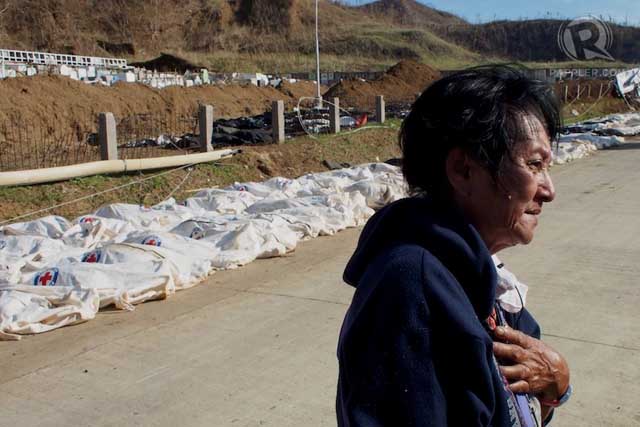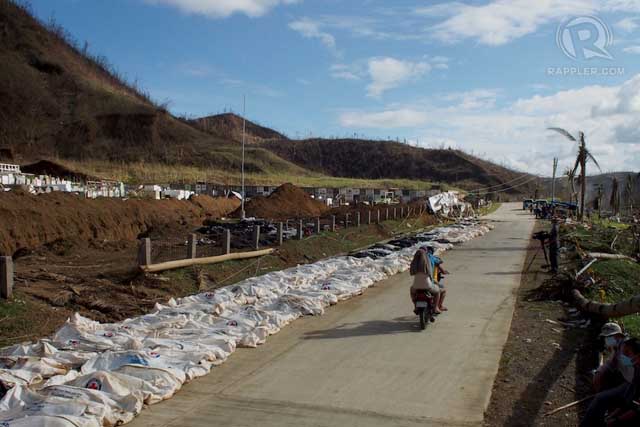SUMMARY
This is AI generated summarization, which may have errors. For context, always refer to the full article.

TACLOBAN CITY, Philippines – Nieves Nerja visits her son every day.
It is a long trip for a woman of 74, particularly a woman who has very little to eat or drink beyond the bottle of water she fills from the family’s sputtering pump. At dawn, she says goodbye to her husband, 78-year-old Cirilo who would weep and worry at her leaving.
She walks, sometimes alone, sometimes with her daughter. In the first few days, she walked with a scarf wrapped around the lower half of her face, picking her way around bodies tangled in debris, over old typewriters and grimy teddy bears, and past the occasional overturned boat. She would walk 4 hours each way, from the house along Imelda Avenue all the way to the police station in Diit. She walked on cold days. She walked on rainy days. She walked on days when the heat broiled the corpses and choked the backhoe drivers in spite of their masks.
Today is Nieves’ twelfth day. This time, the walk is short, from where the motorcycle dropped off Nieves and two children at the bottom of the road. She makes her way up the asphalt, the red umbrella a cane, purple knitted cap pulled over her head, bags slung over bony shoulders. She pays no attention to the fire trucks, walks past the government tents and tripods manned by foreign correspondents.
The long line of white body bags stretch down the cemetery road. Nieves keeps her head down, her eyes on the ground. She is looking for Oscar. She knows he is here.
The morning after

Oscar Nerja was 44 when he died, a house caretaker killed in the surge of water that swept homes into the sea along the coastal village of Diit.
His mother found out the next morning. A man from Diit who had survived the storm brought the family the news.
Nieves left home with her daughter, walked for hours through flood and mud and rain, all the way to the police station, leaving behind a husband whose legs refused to carry him. They found Oscar along the highway. He was bloated, rigid, wounds on his neck. Someone had wrapped his body in a sheet. Nieves had brought another from home, and wrapped him again in white.
They cried, mother and daughter. They asked the police to cover Oscar’s body with a sheet of tin. They prayed over him, talked to him. They asked a friend to stay with the body, to make sure Oscar would be left on the road when the government truck came by to pick up the bodies. Then they left, looking for men to carry Oscar and dig Oscar’s grave and lay Oscar down deep in the ground.
They found no one. They would have paid any price, what little they had.
Everyone is fighting to survive, says Nieves. Everyone has problems. Burying Oscar is hers.
So Nieves walked, every day, from the little house along Imelda Avenue to the highway in Diit where her son Oscar lay under a roof of tin. She came to keep him company, to talk to him, to pray for him, to promise that his mother wouldn’t leave him.
Nieves wants him buried. She knows he is not at peace. He visits at night, she says, touches his nieces’ faces, sits beside his sister, comes in dreams to remind them he is waiting.
A candle on a trench
Twelve days after Oscar Nerja died, his mother follows the truck of corpses in white body bags. She has given up on burying Oscar in his own grave. She has asked the policemen, the firemen, the women in vests of the Department of Health. They tell her there are too many bodies to attempt to bury each separately. Two trenches have been dug, one for the hundreds of unidentified bodies, the other for men like Oscar Nerja.
Oscar was a good boy, says his mother, a kind boy – he sent money home when they were desperate and put his sister’s children to school. His wife Ursula is in Manila attending a wake. They do not know if she was told her husband is dead.
Oscar’s little sister wrote his name on a sheet of paper. They asked the police to slip it inside the body bag. Other bags have been labeled in marking pens, the lumps inside ranging from the very large to the pitifully small. Nieves is waiting for the experts with their identification kits to work their way to Oscar. They will tell her when they find his name. The trench may be filled with hundreds of unknown, but Oscar will be remembered.
Nieves will wait until the men in gloves carry him up the green swath of grass to the trench behind the cemetery wall. She will mark where they lay him with a candle and a prayer, so she will know where her Oscar rests, so Oscar will know his mother is here. – Rappler
Add a comment
How does this make you feel?
There are no comments yet. Add your comment to start the conversation.